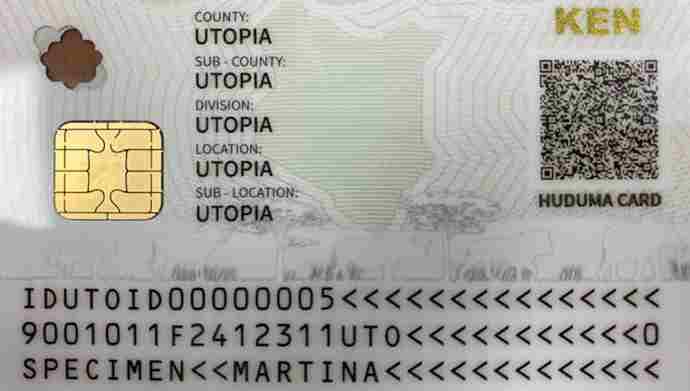We're loading the full news article for you. This includes the article content, images, author information, and related articles.
Kenya is forging ahead with its Maisha Namba digital identity system, drawing lessons from digitally advanced nations like Denmark and Estonia, even as it navigates significant local hurdles related to privacy, inclusivity, and public trust.

Kenya's journey towards a comprehensive digital identity system, dubbed Maisha Namba, continues to unfold, with the government actively studying models from countries such as Denmark and Estonia. These European nations have achieved high rates of digital ID adoption, offering a glimpse into the potential benefits of a streamlined digital infrastructure. However, Kenya's path is marked by unique challenges, including legal battles, concerns over data privacy, and ensuring equitable access for all citizens.
The Kenyan government is committed to its digital transformation agenda, with the Maisha Namba digital ID at its core. As of May 2024, approximately 13 million Kenyans had obtained the new generation Maisha Namba digital ID, with a target to issue 32 million within two years. Principal Secretary for Immigration and Citizen Services, Julius Bitok, stated that between 20,000 and 30,000 Maisha Namba digital IDs are issued daily. The government aims to digitise 80% of its services, making them accessible online through platforms like eCitizen, which currently hosts over 16,000 government services.
In a significant move to enhance accessibility, Interior Cabinet Secretary Kipchumba Murkomen announced in September 2025 the immediate removal of authentication fees for birth certificates required for ID and passport applications. This decision, which also scrapped the KSh 300 fee for first-time national ID registration and KSh 500 verification fee for birth certificates, aims to eliminate cost barriers for citizens. The government further plans to abolish fees for birth and death certificates entirely.
Kenya's pursuit of a digital ID system is not new. The Maisha Namba project, launched in 2023, replaced the earlier Huduma Namba initiative, which was declared illegal by the High Court in October 2021. The court's decision on Huduma Namba was primarily due to the absence of a Data Protection Impact Assessment (DPIA), a requirement under the Kenyan Data Protection Act, 2019.
The current Maisha Namba system, comprising Maisha Namba (Unique Personal Identifier), Maisha Card, Digital ID, and the National Population Master Register, aims to provide a lifelong identification number from birth. This UPI will serve as a child's identification number through school and eventually transition into their national identity number at 18.
The legal framework for the Maisha Namba digital ID was established through regulations inserted into the Registration of Persons Act and the Births and Deaths Act. However, critics argue that these regulations were not subjected to the constitutionally mandated public participation. The Data Protection Act, 2019, remains a crucial piece of legislation, emphasising the protection of personal data and the constitutional right to privacy.
Despite government assurances of voluntary participation, new ID applicants are reportedly being automatically signed up for the Maisha Namba system without explicit consent. Civil society organisations have also raised concerns that the Maisha Namba could become mandatory for accessing public and private services, potentially disadvantaging those without the new cards.
Digital rights advocacy groups, including Haki na Sheria and the Katiba Institute, have filed legal challenges against the Maisha Namba system, citing concerns over potential discrimination, privacy violations, and lack of public consultation. Expert witnesses, such as international lawyer Prof. Laura Bingham and Privacy International senior researcher Dr. Thomas Fisher, have testified that the system's centralised data repository could be used for surveillance and that it risks excluding millions of Kenyans, particularly marginalised communities.
The Kenyan Section of the International Commission of Jurists (ICJ Kenya) has called for human rights to be central to Kenya's Digital Public Infrastructure (DPI) development, advocating for transparent governance, robust accountability, and inclusive development practices.
The primary risks associated with Kenya's digital ID system revolve around data privacy, security, and exclusion. Critics highlight the potential for cybersecurity breaches, especially as many Kenyans access e-government services via cybercafes where data could be compromised. The centralised nature of the Maisha Namba database raises concerns about its potential use as a surveillance tool.
Exclusion remains a significant concern, particularly for marginalised groups and those in remote areas with limited access to electricity or digital literacy. The vetting process for certain communities, despite government claims that Maisha Namba would eliminate it, continues to affect individuals in border and non-border areas.
A major point of contention is the lack of transparency surrounding the Maisha Namba initiative. As of June 2024, no official documentation had been publicly shared explaining the program's parameters, benefits, or costs. The terms of donor engagement and vendor contracts also remain unclear. There is also uncertainty regarding the specific technology stack used for the Maisha Namba, with the previous Huduma Namba having been built on blockchain.
The government's claim of conducting 800 public participation meetings has been challenged, with critics suggesting these were largely information sessions rather than opportunities for meaningful feedback.
The ongoing legal challenges against the Maisha Namba system will be crucial in shaping its future. The courts' decisions on privacy, discrimination, and public participation could significantly impact the implementation and design of the digital ID. Furthermore, the government's efforts to address the digital divide and ensure inclusivity for all Kenyans, particularly marginalised communities, will be a key area to monitor. The transparency of vendor contracts and the overall cost-effectiveness of the project will also remain under scrutiny.
Keep the conversation in one place—threads here stay linked to the story and in the forums.
Sign in to start a discussion
Start a conversation about this story and keep it linked here.
Other hot threads
E-sports and Gaming Community in Kenya
Active 9 months ago
The Role of Technology in Modern Agriculture (AgriTech)
Active 9 months ago
Popular Recreational Activities Across Counties
Active 9 months ago
Investing in Youth Sports Development Programs
Active 9 months ago
Key figures and persons of interest featured in this article